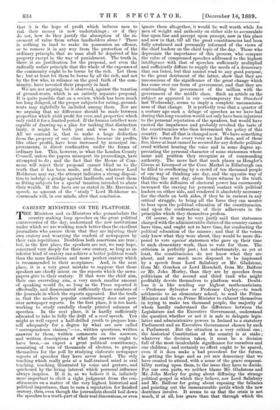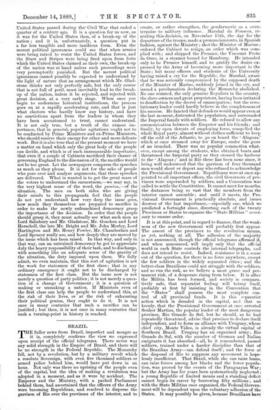CABINET MINISTERS ON THE PLATFORM. T HE Ministers and ex-Ministers who
perambulate the country making long speeches on the great political controversies of the day, understand the new institutions under which we are working much better than the excellent journalists who assure them that they are injuring their own oratory and wearying the readers of newspapers by their vain repetitions. Doubtless both assertions are true ; but, in the first place, the speakers are not, we may hope, concerned very deeply for their own oratory, so long as an inferior kind of oratory can achieve a better political result than the more fastidious and more perfect oratory which is recommended to their acceptance. And, in the next place, it is a very great mistake to suppose that these speakers are chiefly intent on the reports which the news- papers give to their oratory. If that were the chief aim, their one overruling aim, a very much smaller amount of speaking would do, so long as the Press reported it effectually, and disseminated sufficiently those numbers of the journals in which the reports appeared. But the truth is, that the modern popular constituency does not pore over newspaper reports. In the first place, it is too hard- working to study carefully closely printed columns of speeches. In the next place, it is hardly sufficiently educated to take in fully the drift of a read speech. You might as well expect a half-drilled youth to prepare him- self adequately for a degree by what are now called -" correspondence classes,"—i.e., written questions, written answers to them, written comments on the answers, and written descriptions of what the answers ought to have been,—as expect a great political constituency, consisting of tens of thousands of electors, to prepare themselves for the poll by studying elaborate newspaper reports of speeches they have never heard. The only teaching which really gets at a half-trained mind is oral teaching, teaching illustrated by voice and gesture, and quickened by the living interest which personal influence always inspires. If it is, as we believe it is, infinitely more important to elicit a right judgment from the con- stituencies on a matter of the very highest historical and political importance, than to earn a reputation for finished oratory, then, even though the journalists should boil down the speeches to a tenth-part of their real dimensions; or even ignore them altogether, it would be well worth while for men of weight and authority on either side to accumulate line upon line and precept upon precept, now in this place and now in that, till all the great constituencies had been fully awakened and personally informed of the views of the chief leaders on the chief topic of the day. Those who depreciate the importance of this process, who compare the value of compressed speeches addressed to the highest intelligence with that of speeches sufficiently multiplied and sufficiently diffuse to supply the needs of a democracy that can listen, but that cannot read to any good purpose, to the great detriment of the latter, show that they are unconscious of the significance of the great change which has come over our form of government, and that they are confounding the government of the million with the government of the middle class. Such an article on the subject as appeared in our contemporary the Standard last Wednesday, seems to imply a complete unconscious- ness of that change. It is perfectly true that a quarter of a century ago such a deluge of speeches as we have had during this long vacation would not only have been injurious to the personal reputation of the speakers, but would have excited the impatience and probably revolted the taste of the constituencies who then determined the policy of this country. But all that is changed now. We have something like five voters for every voter we had then, and of these five, three at least cannot be secured for any definite political creed. without hearing the voice and in some degree ap- preciating the personal character of some statesman whose name and position they recognise as of commanding authority. The mere fact that such places as Hengler's Circus at Liverpool or the Corn Market in Edinburgh can be filled to overflowing by a crowd of ten thousand people of one way of thinking one day, and the opposite way of thinking the next day, alone bears witness to the truth that the wide diffusion of electoral power has enormously increased the craving for personal contact with political leaders on either side, and rendered it absolutely necessary for the chiefs on both sides, if they be in earnest in any critical struggle, to bring all the force they can muster to bear upon the political education of the constituencies, and upon the confirmation of their adherents in the principles which they themselves profess.
Of course, it may be very justly said that statesmen charged with the administrative duties of the country cannot have time, and ought not to have time, for conducting the political education of the masses ; and that if the voters only knew what they were about, they would be more dis- posed to vote against statesmen who gave up their time to such elementary work, than to vote for them. The criticism is perfectly just ; but unfortunately, as yet at least, the constituencies do not know what they are about, and are much more disposed to be impressed by a speech from Lord Salisbury or Mr. Gladstone, from Mr. Goschen or Lord Herschell, from Mr. Balfour or Mr. John Morley, than they are by speeches from politicians of the second and third rank who might profitably devote themselves to platform work. Doubt- less it is like sending our highest mathematicians, —Professor Sylvester or Professor Cayley,—to teach arithmetic to an elementary school, to send the Prime Minister and the ex-Prime Minister to exhaust themselves in trying to make ten thousand people, the majority of whom hardly understand the difference between the Legislature and the Executive Government, understand the question whether or not it is safe to delegate legis- lative and administrative powers in Ireland to a statutory Parliament and an Executive Government chosen by such a Parliament. But the situation is a very critical. one ; the historical Constitution of the country is at stake; whatever the decision taken, it must be a decision full of the most incalculable significance for ourselves and our children ; and certainly no effort ought to be spared, even if it does make a bad precedent for the future, in getting the huge and as yet raw democracy that We have created to attend, with a sense of the grave responsi- bility resting upon them, to the issue they have to decide. For our own parts, we neither blame Mr. Gladstone and Mr. John Morley for going about diffusing the strange political gospel in which they believe, nor Lord Salisbury and Mr. ,Balfour for going about exposing the fallacies and pointing out the immeasurable perils which the new doctrines involve. It seems to us that the crisis is not much, if at all, less grave than that through which the United States passed during the Civil War that ended a quarter of a century ago. It is a question for us now, as it was for the United States then, of a break-up of the nation ; and it is, unfortunately, a question put in a far less tangible and more insidious form. Even the merest political ignoramus could see that when armies were being raised to resist the United States forces, and the Stars and Stripes were being fired upon from forts which the United States claimed as their own, the break-up of the nation was at hand unless such proceedings were very peremptorily punished. But the merest political ignoramus cannot possibly be expected to understand by the light of nature that an arrangement which Mr. Glad- stone thinks not only perfectly safe, but the only course that is not full of peril, must inevitably lead to the break- up of the nation, unless it be rejected, and rejected with great decision, at a very early stage. When once you begin to undermine historical institutions, the process goes on at a rapidly accelerating rate, and that is just what electors who hardly know any history, and have no convictions apart from the leaders in whom they have been accustomed to trust, cannot understand. It is not only true, but a truth of the utmost im- portance, that in general, popular agitations 'ought not to be conducted by Prime Ministers and ex-Prime Ministers, who should reserve their energy for other and more delicate work. But it is also true that at the present moment we have a matter on hand which only the great body of the people can decide, and which is of such immeasurable importance, that even if a couple of Cabinets sacrificed their chance of governing England to the discussion of it, the sacrifice would not be too great. Let the newspapers compress the speeches as much as they please. It is not for the sake of people who pore over and analyse arguments, that these speeches are delivered. What is wanted is to get the great mass of the voters to understand the earnestness,—we may say, in the very highest sense of the word, the passion,—of the situation. The men on both sides who are giving their minds to this propaganda feel that the people do not yet understand how very deep the issue goes, how much they themselves are prepared to sacrifice in order to make the newly enfranchised democracy grasp the importance of the decision. In order that the people should grasp it, they must actually see what such men as Lord Salisbury and Mr. Gladstone, Mr. Goschen and Lord Herschell, the late Mr. Bright and Mr. John Morley, Lord Hartington and Mr. Henry Fowler, Mr. Chamberlain and Lord Spencer really are, and how deeply they are moved by the issue which has been raised. In that way, and only in that way, can an untrained democracy be got to appreciate duly the heavy responsibility of their task, and to discharge, with something like an adequate sense of the gravity of the situation, the duty imposed upon them. We fully admit, we even maintain, that this sort of agitation is not the work for statesmen of the first class ; that in any ordinary emergency it ought not to be discharged by statesmen of the first class. But the issue now is not merely a question of party politics ; it is not merely a ques- tion of a change of Government ; it is a question of making or unmaking a nation. If Ministers even of the first class can help the people to understand this, at the risk of their lives, or at the risk of exhausting their political genius, they ought to do it. It is not once in many centuries that such a sacrifice can be justified ; but then, it is not once in many centuries that such a turning-point in history is reached.











































 Previous page
Previous page